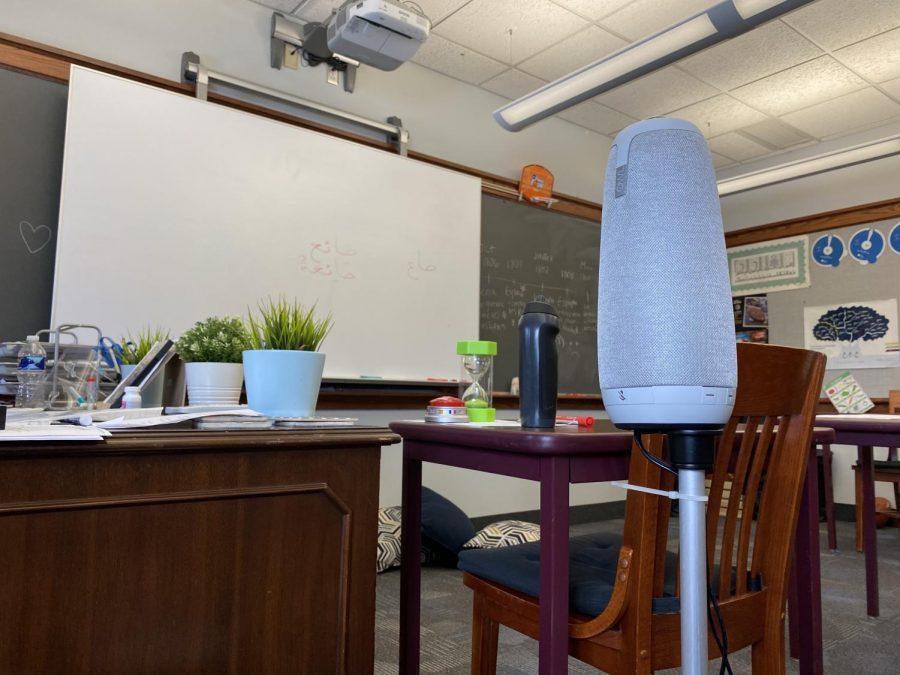COVID-19 regulations affect the classroom dynamic
Classrooms throughout Hill are finding ways to work around the COVID-19 restrictions enforced. Gabriela Gomez, a language teacher, found herself moving her classroom outside to create a better work setting for the students. Videos are replacing conversations in class to avoid the muffled voices caused by the required face coverings.
New innovations are being discovered by the faculty members of Hill, but trying to achieve them takes a lot of trial and error.
“Nothing about this year has been easier,” Gomez stated in an email.
Although teaching a language might be difficult, there are other departments in The Hill School facing the same obstacles in similar ways.
Hill has been following the six-feet socially distancing rule since the fall and continues to do so today. This includes the spacing inside the classroom setting: each individual desk is precisely distanced and limited to only a certain area.
“I had to change a lot because of the physical space restrictions that we had. Normally I have the desks that roll around and we’d always do different formations and kids could move into pair and group work,” Larissa Snyder, instructor of English, said. “It definitely changed the classroom dynamic.”
Teaching from a distance is an obstacle, but so is the virtual aspect. For all Hill teachers, this is the first year that they have had virtual and in-person students, creating an unequal experience for the people at home.
“I think I’m pretty lucky that a lot of my virtual remote students are putting a lot of effort into doing the best they can in class,” Shannon Ruane, a science intern, said. “I wish they could be a lot more involved.”
Senior Master of Mathematics Matthew Gettings also said he has struggled to teach everyone and deal with the setbacks. Gettings described the experience as “challenging” but being able to teach has its own positive aspects.
Even though classes were being held, that did not mean every piece of content was covered. Many topics had to be removed from the curriculum based on the amount of time in the school year.
“We prioritized some topics where we had to leave out some classes because we felt like we just didn’t have enough time; we weren’t meeting as much,” Gettings said.
The pressure placed on the teachers for their lesson plans is seen all around campus, creating a sense of pressure among the teachers and students to complete the workload.
The school year at Hill comes to a conclusion on May 26. Many AP classes are also cutting down on the topics being taught, leaving their students unsure about the tests coming up.
“Almost all my classes either cannot finish the material on the test or are rushing through to complete the teaching material necessary for the assessments,” Sarah Jiang ’22 said. “I feel nervous about how my AP test results will turn out.”
COVID-19 restrictions and effects are seen taking a toll on the classroom setting. This past school year has not been like any in the past, leaving a lot unprecedented.
Teachers are still wondering about the future school years coming up.
“In terms of the classroom, next year I sure hope that everyone is in person, and we are able to go back to a ‘normal’ classroom experience,” Jennifer Weissbach, instructor of science, said. “I think it was good for us to test out all these tools and technology that we might not have during a normal year.”
While there may have been some positive outtakes from this year, it still does not cancel out the stress and struggles placed on the Hill community. Obstacles and curveballs were thrown everyone’s way, but they affected everyone differently.
“It doesn’t compare to anything I’ve ever experienced. It’s difficult for everyone,” Gomez stated in an email. “There are so many things to take into consideration that have nothing to do with the actual class and first is people’s mental health and wellbeing is more important.” She said students are struggling with isolation, depression and the loss of their graduation (last spring) or sports season. “Everything is different.”
























